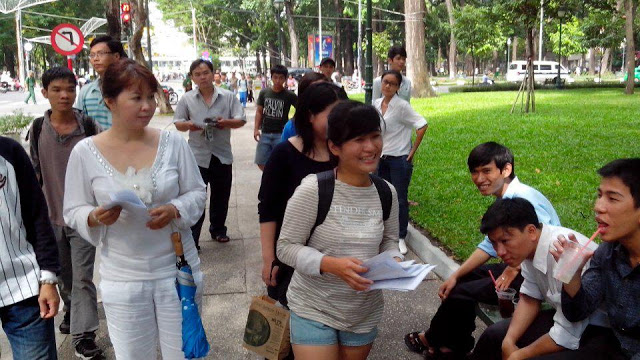June 20, 2013
HRW: Vietnam Escalating Persecution of Bloggers

Rights activist Nguyen Hoang Vi distributing Universal Declaration of Human Rights to people on May 5 at April 30 park.
© Dan Lam Bao 2013
Recent Arrests, Physical Attacks Require Strong Diplomatic Response
(New York, June 20, 2013) – The Vietnamese government should unconditionally release recently arrested bloggers and end physical attacks on critics, Human Rights Watch said today. Vietnam’s donors and trading partners should publicly call on the government to end the use of the criminal law against peaceful activists.
[pullquote]
“Vietnam’s strategy of repressing critics big and small will only lead the country deeper into crisis. The latest arrests and assaults on bloggers show how afraid the government is of open discussion on democracy and human rights.”
Brad Adams, Asia director
[/pullquote]
Human Rights Watch called for the immediate and unconditional release of recently arrested bloggers Truong Duy Nhat and Pham Viet Dao, as well as internet activist Dinh Nhat Uy, and an investigation into allegations that police assaulted internet activists Nguyen Chi Duc, Nguyen Hoang Vi, and Pham Le Vuong Cac, whose security the authorities should protect.
“Vietnam’s strategy of repressing critics big and small will only lead the country deeper into crisis,” said Brad Adams, Asia director. “The latest arrests and assaults on bloggers show how afraid the government is of open discussion on democracy and human rights.”
Many of the arrests have come under Vietnam Penal Code article 258, one of several vague and elastic legal provisions routinely used to prosecute people for exercising their right to freedom of expression. Recent cases of arrest and assault include the following:
On May 26, 2013, Ministry of Public Security officers arrested blogger Truong Duy Nhat for “abusing democratic freedoms to infringe upon the interests of the State, the legitimate rights and interests of organizations and/or citizens,” according to the Vietnamese newspaper Thanh Nien. The arrest at his home in Da Nang of the 49-year-old followed his posting on his popular “A Different Perspective” blog of a call for the resignation of Vietnamese Prime Minister Nguyen Tan Dung and ruling Communist Party General Secretary Nguyen Phu Trong, blaming them for leading Vietnam into worsening political and economic difficulties.
On June 7, 2013, five men believed to be police officers assaulted 26-year-old blogger Nguyen Hoang Vi (also known as An Do Nguyen) and legal activist Pham Le Vuong Cac on a Ho Chi Minh City street. According to Vietnamese bloggers, the attackers had been monitoring Nguyen Hoang Vi and her family for several days and beat her into unconsciousness, leaving wounds requiring hospital treatment. Nguyen Hoang Vi is a prominent Internet personality who was also attacked on May 5-6, 2013, after playing a leading role in an attempted “human rights picnic” in Ho Chi Minh City.
On June 13, police arrested 61-year-old blogger Pham Viet Dao at his Hanoi home, also for “abusing democratic freedoms,” according to an announcement by the Ministry of Public Security, thus signalling his likely prosecution under article 258. His website, like that of Truong Duy Nhat, had been critical of a number of Vietnamese political leaders.
On June 15, Dinh Nhat Uy was arrested pursuant to article 258. His younger brother, Dinh Nguyen Kha, had been sentenced to eight years in prison on May 16, 2013, for distributing leaflets critical of state foreign and domestic policies. Dinh Nhat Uy, 30, was arrested in Long An province after launching an Internet campaign calling for his brother’s release and posting pictures and notes on his Facebook account. He was accused of “distorting the truth and badly influencing the prestige of state organizations,” as the official news Agency VNA put it.
Article 258 is used to prosecute those whom the government maintains “abuse the rights to freedom of speech, freedom of press, freedom of belief, religion, assembly, association and other democratic freedoms to infringe upon the interests of the State, the legitimate rights and interests of organizations and/or citizens,” and provides for up to seven years’ imprisonment for those who commit this supposed offense “in serious circumstances.” Vietnam’s politically controlled courts routinely apply such provisions to imprison people for peaceful expression.
The government is increasingly cracking down on criticism of corruption and authoritarianism, Human Rights Watch said. Those recently targeted represent a spectrum of public opinion, as Truong Duy Nhat, Pham Viet Dao, and Nguyen Chi Duc formerly worked for the ruling authorities, Truong Duy Nhat worked in the official media, Pham Viet Dao was a government official, and Nguyen Chi Duc was a member of the Communist Party. Dinh Nhat Uy, Nguyen Hoang Vi, and Pham Le Vuong Cac reflect dissent among those in the younger generation without such ties.
“Donors and trading partners need to stand with those in Vietnam struggling for their rights and make it clear that no one should be arrested or assaulted for their opinions,” Adams said. “They should insist that the only future for countries trying to develop and modernize is a free and open society in which the authorities accept that criticism is a normal part of the political process.”
Source: Human Rights Watch
[subscribe2]






July 31, 2013 @ 5:13 AM
I am really thankful to the owner of this site who has shared this wonderful post at at this place.
October 17, 2013 @ 2:10 AM
I always emailed this weblog post page to all my friends, since
if like to read it next my friends will too.
October 21, 2013 @ 1:02 PM
continuously i used to read smaller articles or reviews
which also clear their motive, and that is also happening with
this piece of writing which I am reading at this place.
October 22, 2013 @ 9:19 PM
Generally I don’t learn post on blogs, but I wish to say that this write-up very compelled me to check out and do
so! Your writing style has been surprised me. Thanks, very great post.